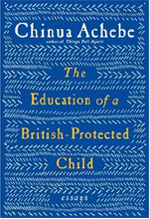In the preface to his 1972 short story collection, Girls
at War, Chinua Achebe commented that it was “something
of a shock” that his earliest stories were published
“as long as twenty years ago” and he could therefore
no longer be described as “new”. Four decades
later, his volume of essays The Education of a British-Protected Child, published in the UK this month,
is both familiar and still fresh, revisiting expected themes
and yet charming the reader anew.
Controversially hailed as one
of the founding fathers of African literature, Achebe’s
career spans a period of radical change, from the optimism
of Nigerian Independence to transatlantic elation at Obama’s
election. Things Fall Apart has inspired five generations
of adults and schoolchildren. Looking back at these years,
Achebe comments: “I wanted very much to shine the torch
of variety and of difference on the experiences my life has
served up to me, illuminating what it is that unites my writing
and my personal life.” The resulting volume brings
together pieces dating from 1988 to 2009.
The title essay of the collection
recounts the young writer’s realisation on receiving
his first passport, that he was defined as a “British
Protected Person”. Of the disingenuous patronage of
colonialism Achebe makes it clear straight away he will offer
“only cons”. Not unexpected for anyone familiar with his work. The
statement though is tempered by a pledge to explore the middle
ground – antithetical to the fanaticism Achebe terms
the “One Way, One Truth, One Life menace”. The
nuanced space he roams around in this essay is that of his
education at Government College Umuahia, a school where he
studied with a remarkable number of the incipient heroes of
African literature. He remembers with fondness his extraordinary
head teacher, a Cambridge mathematician who forbade the reading
of text books on three days a week in favour of the perusal
of novels. It is perhaps no coincidence that Achebe’s
fellow alumni included amongst others the leading poet of
his generation, Christopher Okigbo, and the writer and environmental
activist Ken Saro-Wiwa. Tragically both were to die far too
young – Okigbo fighting for Biafra, Saro-Wiwa protesting
Shell’s oppression of the Ogoni people.
The passion and commitment of
this, the first generation of internationally recognised African
writers, resonates throughout the book. Achebe describes
their heady optimism in his account of an infamous conference
at Makerere University, Uganda in ’62. Evoking debates
that still dominate the field, he recalls animated discussions
of language and identity, the endless “problem of definition”.
On the relevance of literature though he is unequivocal.
Describing the advent of African literature as one of the
most beneficial explosions to rock the continent in the 60s
and 70s, he derides the “fashionable claim” that
“literature can do nothing to alter our social and political
condition” with the admonition, “of course it
can!”.
One of the most humbling and
inspiring aspects of this collection is Achebe’s enduring
belief in the relevance of literature and his public responsibilities
as a writer. In “Africa Is People” he tells the
story of a meeting of the Organisation for Economic Co-operation
and Development that he was asked to attend in 1989. Initially
rather unsure as to why he had been invited, he listened with
growing unease to the theoretical suppositions of international
economists, convinced that structural adjustment regimes merely
required time. Achebe describes his sudden realisation that
what was going on before him was “a fiction workshop, no more no less!”. Standing to take the floor, he
then addressed the room of international experts, protesting:
“Here you are spinning
your fine theories, to be tried out in your imaginary laboratories
[...] and hoping for the best. I have news for you. Africa
is not fiction. Africa is people, real people. [...] Have
you thought, really thought, of Africa as people?”
It takes the novelist to offer
the antidote to dehumanising abstraction. It is the writer
of fiction who sees the stories the others are spinning for
themselves. Achebe is an uncompromising critic of misrepresentation:
from his enduring indictment of that “thoroughgoing
racist” Joseph Conrad with his dangerously “fanciful”
descriptions of the Congo, to his fierce criticism of the
flaws of leadership in Nigerian politics. His reproaches
carry with them the urgency of someone who feels the enduring
injustices of the world personally. In “Recognitions”
the author identifies with the courage of fellow Igbo, Olaudah
Equiano, who overcame incredible odds to write the history
of his life as an enslaved person. In “Traveling White”
he recounts his experience of racial segregation on buses
in then Rhodesia. Consistently he seeks to point out how
images and myths about Africa in international circulation
remain complicit with ongoing inequalities, the culprits ranging
from thoughtlessly essentialist children’s books to
images of African suffering in the media.
But this is all beginning to
sound too earnest, an accusation it would be hard to level
at Achebe’s playful prose. Alongside serious debate,
The Education of a British-Protected Child is a monument
to Achebe’s infectious love of language, to his lively
turn of phrase and his assured self-doubt – “I
may be wrong; if so, who cares?”. The collection is
not a finely crafted and structurally coherent whole –
as the author himself points out there are gaps and repetitions.
But these essays bring together decades of fearless engagement
with literature and politics, and above all with the quirks
of personality that render each person Achebe describes ineffably
human.  |

![African Writing Online Home Page [many literatures, one voice]](http://www.african-writing.com/nine/images/logo9.png)









![]()
![]()


